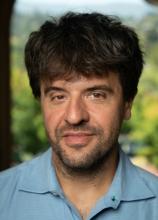Karl Deisseroth to share Horwitz Prize for pioneering contributions to optogenetics
By Bruce Goldman
Karl Deisseroth, MD, PhD, the Stanford Medicine D.H. Chen Professor as well as a professor of bioengineering and of psychiatry and behavioral sciences, has been named a recipient of the 2022 Louisa Gross Horwitz Prize for his foundational contributions to the advancement of optogenetics, a technology that has transformed neuroscientific research.
The Horwitz Prize has been awarded annually by Columbia University since 1967 for groundbreaking work in medical science. Of the 108 previous Horwitz Prize winners, 51 have gone on to receive Nobel prizes.
Deisseroth, who is a Howard Hughes Medical Institute investigator, will share the prize — to be presented at a ceremony in New York on Feb. 16, 2023 — with two other pioneers in the field: Peter Hegemann, PhD, professor of neuroscience at the Institute of Biology and Experimental Biophysics at the Humboldt University of Berlin; and Gero Miesenböck, MD, professor of physiology at the University of Oxford, UK.
“The Horwitz Prize has a long, distinguished history, and this year it recognizes Karl Deisseroth’s outsized contributions that forged the field of optogenetics,” said Lloyd Minor, MD, dean of the Stanford School of Medicine. “His research has led to significant advances in neuroscience that enable greater understanding of the inner workings of the human brain and are helping to address a wide range of neurological conditions.”
